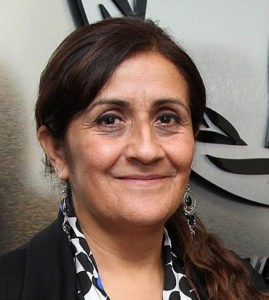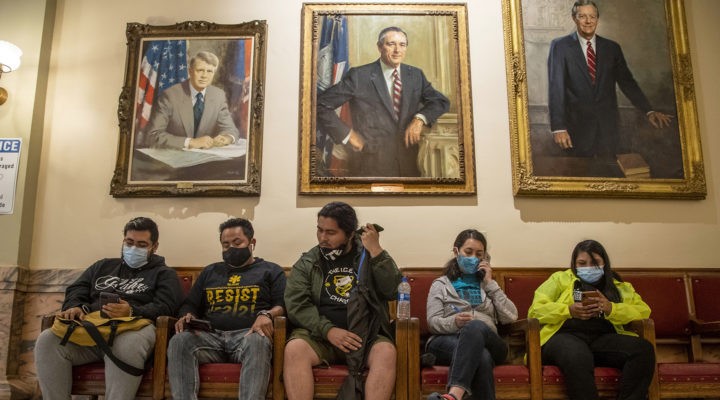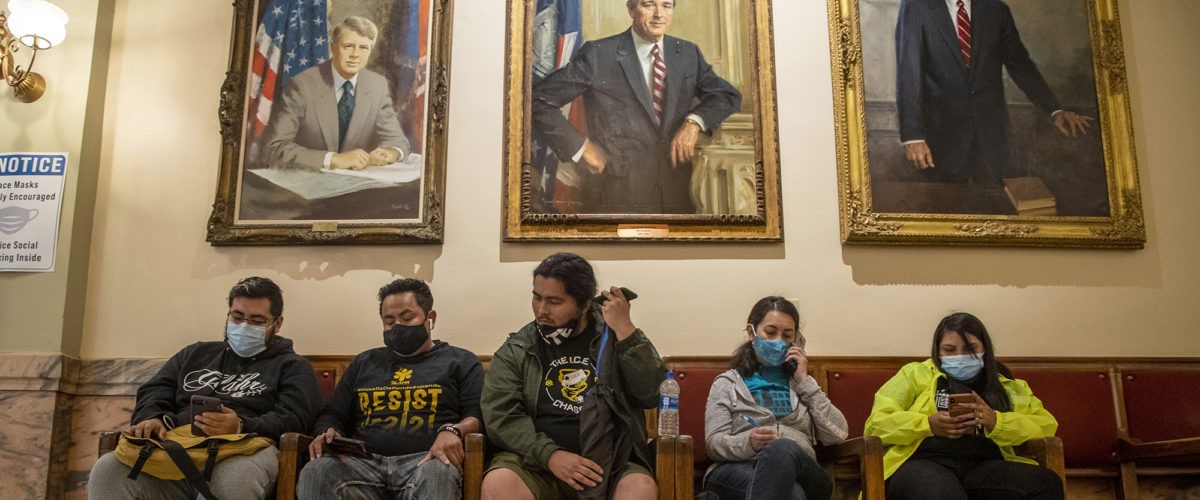Bishop Carl McRae remembers growing up in the Jim Crow South as a native Georgian. What he sees happening in Georgia with new restrictive voting laws feels even worse than that, he said.
“I’ve never seen anything so bold. And I grew up in the Jim Crow South when there was a colored and a white water fountain. We can’t go back,” said McRae, founding pastor of Exousia Lighthouse International Christian Ministries in Lithonia, Ga. “We are dealing with the issues that are trying to reduce Black and brown people to a place we don’t want to go again. I go to bed thinking about this and wake up thinking about this.”
That’s why the pastor is part of a broad coalition that has filed suit in federal court to block implementation of Senate Bill 202, Georgia’s already notorious voting restriction law.

Carl McRae
“I have a picture in my home that was painted of the building I went to at the March on Albany back in the day,” he said. “I was a kid. I remember the fear of my mom and others when my dad was involved. I remember his pushback.”
Both his father and grandfather were civil rights organizers. “I was an upfront witness to that as a child,” McRae said. “I remember (my father) not allowing me to drink from the colored water fountain.”
And now, “imagine the hard-won wins we accomplished in this state to find ourselves right back where we were when I was a kid. I remember this stuff; it’s in my spirit. When I consider my presence here and the importance of what it is we’re doing, it’s based on that story, based on that history.”
That reality, he added, “is not only ironic, it is excruciatingly painful that here we are again dealing with the same demons of our past that refuse to die.”
‘Full-frontal assault on voting rights’
To McRae and many other faith leaders in Georgia, Senate Bill 202 represents a “full-frontal assault on voting rights” targeting Black and brown and disabled voters. The bill’s advocates claim the legislation was necessary to address voter fraud that caused Republicans to lose two U.S. Senate seats and the presidential election.
The bill’s advocates claim the legislation was necessary to address voter fraud that caused Republicans to lose two U.S. Senate seats and the presidential election.
No evidence of such fraud has been made public, yet the sweeping reforms were drafted and enacted within weeks of the 2020 presidential election and the subsequent runoff election for the two Senate seats. Former President Donald Trump famously called Georgia election officials to encourage them to “find” more votes for him and tilt the election.
In 2020, nearly 5 million Georgians cast ballots in the November elections, making heavier-than-before use of mail-in ballots and early voting, exacerbated by the coronavirus pandemic. The new state legislation — called by state Republicans the Election Integrity Act of 2021 — prevents such broad access to the ballot box in the future, makes it illegal to hand out food and water to voters waiting in line and strips the power of the elected secretary of state to chair the state election board. It also allows the state election board to take over election administration at the county level for minimal cause.
“This takes away voter accountability. And for any Black and brown representative that has been elected by these communities, it strips away their power,” said Esperanza Segarra, senior staff attorney for the power and democracy team at the Advancement Project, which is leading the legal fight.

Darryl Winston
“This law was conceived and brought forth on the bed of deception,” said Darryl Winston, pastor of Greater Works Ministries, a Pentecostal church in Atlanta. “This is immoral. It is rife with discriminatory measures aimed directly at Black and brown communities where there was record voter turnout. This law also creates impediments on several fronts causing undue burdens for seniors and students to vote, as well criminalizing acts of compassion. We cannot forget that allegations of widespread voter fraud were debunked by the U.S. Department of Justice.”

Adelina Nichols
“As an organizer who has spent the last 15 years knocking on the doors of Latinos in every part of Georgia, I can tell you firsthand: this state has not made it easy for our communities to cast their votes,” said Adelina Nichols, executive director of the Georgia Latino Alliance for Human Rights. “From polling places only offering materials in English to workplaces not offering time off to vote, to a fundamental lack of information about Election Day logistics, Latino voters are regularly disenfranchised. But the voter suppression included in SB 202 is even more egregious. There is no question in my mind: this law was designed to extinguish the progress made by decades of electoral organizing in Georgia’s communities of color.”
Nature of the lawsuit
Segarra said the lawsuit that seeks to stop implementation of Senate Bill 202 is a federal case based on claims in the First Amendment, 14th Amendment, 15th Amendment, the Voting Rights Act and the Americans with Disabilities Act.
Ironically, she added, if the U.S. Supreme Court had not struck down part of the Voting Rights Act in a narrow decision in 2013, the new Georgia law would have been illegal from the get-go and could not have been implemented.

Esperanza Segarra
“The fact of the matter is that the law is a voter suppression law,” she said. “That is a fact. The claims that we’re bringing are pretty much built around that fact. … In layman’s terms, we are targeting the question of the blatantness of the law that targets the Black and brown communities.”
While Georgia Republicans have claimed their bill is not partisan, the state Republican Party is now petitioning the court to be added as a defendant in the lawsuit, which currently names Secretary of State Brad Raffensperger as a representative of the state. That would allow party officials — in addition to state elected officials like Raffensperger — to more directly intervene in the case.
“We don’t see why the Republican Party considers itself an important party to the case,” Segarra said. “It’s not a Democrat or Republican issue; it’s a democracy issue.”
The lawsuit was filed by the Advancement Project on behalf of the Samuel DeWitt Proctor Conference, Concerned Black Clergy, Mijente, the Georgia Latino Alliance for Human Rights, Faith in Action and a coalition of churches. It is one of at least six lawsuits already filed to stop the new voting restrictions from being implemented.
“The fact of the matter is that the law is a voter suppression law.”
Galvanizing the faith community
Churches are banding together like seldom before to fight this new law, said McRae, the Lithonia pastor.
“I don’t think there’s any other fight that a pastor who believes in the gospel of Jesus Christ can be in at this time,” he said. “We are at one of those critical moments in time that can go either way. It is a moment in time for every person who’s interested in lifting up the lives of marginalized people. It brings to bear the issues of justice and the prospect of a more ardent and just world. We are at a place right now where the gospel of Easter has to be merged with the gospel of the marginalized.”
Concerned Christians must “speak truth to power,” he added and “be bold and unabashed in calling out the powers that be and their full-frontal attack against justice and against the right to vote.”
Georgia a testing ground
Meanwhile, Georgia has become a testing ground not only for passage of bills making it harder to vote but for the legal defense of them.
“We actually draft them for them, or we have a sentinel on our behalf give them the model legislation so it has that grassroots, from-the-bottom-up type of vibe.”
“Georgia’s SB202 is an extreme measure of what we’re seeing across the country,” said Segarra, who finds it curious that a 90-page omnibus bill was put together within a matter of a few weeks. “When you look at the extent of the bill itself and the fact that it’s being replicated in others states almost verbatim, it seems clear this is something being orchestrated.”
Mother Jones magazine broke a story May 13 that explicitly confirms Segarra’s suspicions. It reported: “In a private meeting last month with big-money donors, the head of a top conservative group boasted that her outfit had crafted the new voter suppression law in Georgia and was doing the same with similar bills for Republican state legislators across the country.

Jessica Anderson
Jessica Anderson, executive director of Heritage Action for America, was recorded telling donors: “In some cases, we actually draft them for them, or we have a sentinel on our behalf give them the model legislation so it has that grassroots, from-the-bottom-up type of vibe.”
Heritage is spending $24 million over two years in eight battleground states — Arizona, Michigan, Florida, Georgia, Iowa, Nevada, Texas and Wisconsin — to pass and defend restrictive voting legislation, Anderson said.
Mother Jones reported Anderson telling the donors that every Tuesday her group leads a call with right-wing advocacy groups like the Susan B. Anthony List, Tea Party Patriots, and FreedomWorks to coordinate these efforts.
“We literally give marching orders for the week ahead,” Anderson said. “All so we’re singing from the same song sheet of the goals for that week and where the state bills are across the country.”
Related articles:
Voting rights and the people who died for them: Jonathan Daniels et al. | Opinion by Bill Leonard
Voting rights and the ninth commandment | Analysis by Stephen Reeves
A vote is ‘a kind of prayer,’ Warnock says in first Senate speech
What I learned about voter suppression while sitting in the Quiet Chair as a child | Opinion by Paula Mangum Sheridan


